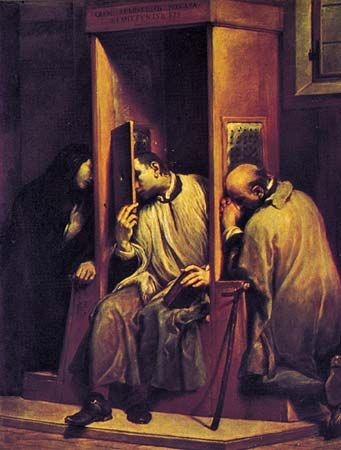The Catholic Encyclopedia explains that a sacrament “is an outward sign instituted by Christ to impart grace to the soul.” All Christians believe in at least one sacrament: Baptism. Some Protestants allow more than one, such as Matrimony, the Lord’s Supper, and Holy Orders. The Catholic Church has seven sacraments. Every Catholic sacrament is referenced and authorized somewhere in the Scriptures. For the Sacrament of Penance (which requires confession) here is the authority given to the apostles by Jesus : “As the Father hath sent me, I also send you. When he had said this, he breathed on them; and he said to them: ‘Receive ye the Holy Ghost. Whose sins you shall forgive, they are forgiven them; and whose sins you shall retain, they are retained.’” (John 20:22-23)
Curiously, and despite the fact there is no other interpretation possible for this passage, many Protestant sects do not believe this pastoral power was ever given to the apostles and their successors, but there are abundant witnesses from the early Church who testified to its efficacy. Moreover, if confession of sins had never been commonplace in the early days of the Church, and was suddenly was imposed on Christians during a later century, there would have been a great hue and cry recorded throughout the Christian world. That hue and cry was never recorded because it was never heard.
But how can sins be forgiven, or not forgiven, if they are not first confessed? Confession cannot be merely a mouthing of one’s sins. Confession is not the end point of receiving the sacrament, but true remorse and penance are. The person confessing has confessed truly, without reservation, and is sincerely remorseful. Finally, the priest recommends some sign of atonement, a penance that is performed as proof of true remorse.
The joy that comes from confession, and the experience of being forgiven by the priest as alter Christus, is something non-Catholics can hardly imagine. To many outside the Church, confession may seem an act of abject humiliation. As the Catholic philosopher Blaise Pascal noted, perhaps this sacrament is the only one that has kept many from entering the Church, or has driven some Catholics away. When I was a boy in the 1950s, confession was popular; lines of penitents outside the confessional were long enough to allow plenty of time for the examination of conscience and the making of a list sure to include all mortal sins.
But civilization today is in a dark and therefore dangerous place. Could there be an explanation for this? Could it be that darkness descends because we have not looked inward to expel the demons who have taken up residence in our hearts? Does darkness descend because we have chosen not to confront those demons and do battle with them? Does that darkness become even darker and more ‘pandemic’ because we have not confessed our sins, sought forgiveness of God through the priest, and done the requisite penance to prove our remorse is true?
The reason for this is that too many souls are too proud to admit their sins. Humility is required. Perhaps it was for this reason that, at least until modern times, the Church wisely instituted the privacy of the confessional, a quiet, dark and boxed-in area where the priest and the penitent were guaranteed anonymity in each other’s presence. Could it be the abandonment of this closet confessional space that has discouraged the practice of confession for many Catholics? The more recent practice of the priest and the penitent facing each other seems to allow or risk distractions from the essential quality of the moment. The old confessional box suited the darkness of a moment necessary and prelude to the burst of light and joy about to happen as the priest speaks the words of absolution.
“Ego te absolvo!”
Confession reaches deeper than counseling, though one does not exclude the other. The psychiatrist can find out our sins if he digs deep enough, but the digging up of them is not inevitably accompanied by one ounce of remorse. Nor can the psychiatrist in the name of Christ forgive sins. Moreover, confession to a priest and the assurance of Christ’s forgiveness are free for the asking, while the psychiatrist will not forgive his fee.
As Archbishop Fulton Sheen once remarked in his book On Being Human: “The people who are dragging their shame into a confessional box, with their feet hanging out from under a curtain like wiggling worms, have courage to face their own shame. It is the cowards who are running off to pillboxes, and to a thousand and one other escapes, who have not the courage to face that which has within themselves the possibility of great dignity.”
In the Catholic Church every priest is alter Christus. He is empowered to act as Christ acted. We remember what Christ said to the man with the palsy:
“Thy sins are forgiven thee.” The Scribes were appalled, and said, “Why does this man speak thus? He blasphemes. Who can forgive sins but God only?” But Jesus seeing their thoughts, said to them: “Which is easier to say to the sick of the palsy: Thy sins are forgiven thee; or to say, Arise, take up thy bed and walk? But that you may know that the Son of man has power on earth to forgive sins, (he said to the sick of the palsy,) I say to thee: Arise, take up thy bed, and go into thy house.” (Mark 2:5-11; Matthew 9:2-7)
Some Further Thoughts:
Come, now again thy woes impart,
Tell all thy sorrows, all thy sin;
We cannot heal the throbbing heart
Till we discern the wounds within
George Crabbe
God makes no distinction; He promised mercy to all and to His priests He granted the authority to pardon without any exception – St. Ambrose
Go to your confessor; open your heart to him; display to him all the recesses of your soul; take the advice that he will give you with the utmost humility and simplicity. For God, Who has an infinite love for obedience, frequently renders profitable the counsels we take from others, but especially from those who are the guides of our souls. – St. Francis de Sales
The confession of evil works is the first beginning of good works. You do the truth and come to the light. – St. Augustine
In the life of the body a man is sometimes sick, and unless he takes medicine, he will die. Even so in the spiritual life a man is sick on account of sin. For that reason he needs medicine so that he may be restored to health; and this grace is bestowed in the Sacrament of Penance.– St. Thomas Aquinas
The want of proper examination, true contrition, and a firm purpose of amendment, is the cause of bad confessions and the ruin of souls. – St. Benedict Joseph Labre
Answering those who regard confession as a morbid dwelling on sinfulness, G.K. Chesterton said: The morbid thing is NOT to confess. The morbid thing is to conceal your sins and let them eat away at your soul, which is exactly the state of most people in today’s highly civilized communities.












